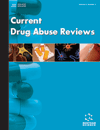-
oa Editorial: The Need for an Effective Hangover Cure
- Source: Current Drug Abuse Reviews, Volume 5, Issue 1, Mar 2012, p. 1 - 2
-
- 01 Mar 2012
Abstract
The alcohol hangover, i.e. the feeling of general misery the day after heavy drinking, is characterized by several symptoms including headache, tiredness, concentration problems, thirst, dizziness, nausea, cognitive impairment, and mood changes [1]. Already more than three thousand years ago the Susruta Samhita, an old Indian textbook on Vedic medicine, described the alcohol hangover state. It was called paramada and characterized by thirst, pain in the head and joints, heaviness of the body, and loss of taste [2]. The Susruta Samhita did not provide any treatment or cure for hangovers. Although alcohol hangovers are still the most commonly reported negative consequence of alcohol consumption [3], no effective treatment is available yet [4, 5]. Whereas treatments for most diseases have significantly improved over the past 3000 years, the alcohol hangover has been largely neglected by the scientific community. The reasons for this lack of attention are unclear, especially given the negative impact of alcohol hangover on daytime functioning. The latter is reflected by the fact that alcohol hangovers have significant socioeconomic consequences [6]. That is, hangovers may result in absenteeism and reduced productivity at work, increase the risk of injury, and cause people to fail to fulfill their social obligations [7-9]. Hence, from a financial and social perspective it would be wise to develop an effective hangover treatment, and it is therefore surprising that pharmaceutical companies have not been active in this research area. It has been suggested that it is unethical to develop an effective treatment for hangovers, because this may encourage alcohol consumption. A hangover is seen as a punishment for excessive alcohol consumption that prevents similar drinking behavior on future occasions. There is however no scientific evidence that supports this assumption. Whereas during the hangover state people often state they will “never drink again (...that much)”, reality learns that people do not learn from their mistakes. Hence, most people do not adapt their future drinking behavior after having experienced a hangover [10]. On the contrary, heavier drinking students overestimated the amount of alcohol they can consume without experiencing a next-day hangover [10]. There is considerable commercial interest in the alcohol hangover, given the large number of cures available on the internet. Although websites often claim that their product has proven to be effective in reducing the presence and severity of hangover symptoms, this is generally not true. In fact, placebo-controlled clinical trials examining the effectiveness of their products are lacking, or the product showed limited or no efficacy [4, 5]. As a result, no hangover treatment has been approved by FDA....


